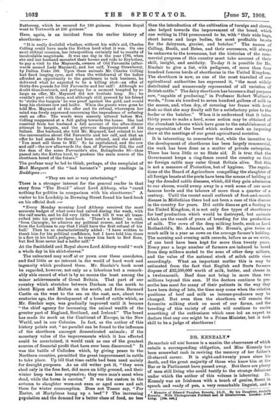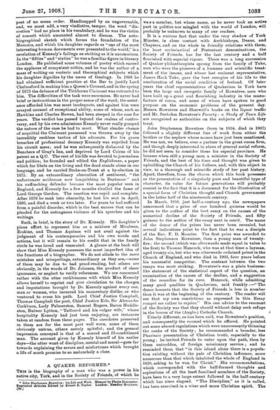DR. KENEALY.*
De mortuis nil nisi bonum is a maxim the observance of which entails a corresponding obligation, and Miss Kenealy has been somewhat rash in reviving the memory of her father's ill-starred career. It is eight-and-twenty years since his death, and the great majority of those who knew him at the Bar or in Parliament have passed away. But there are plenty of men still living Who could testify to the strange delusions under :which the author of this volume is labouring. Dr. Kenealy was an Irishman: with a touch of genius, fluent in speech and ready of pen, a very remarkable linguist, and a Memoirs of Edward Vaughan /reseals; LL.D. By his Dauebter, Arahell* Benealy. With Photogravure Portrait and lit Illuatrationa London; John Long. [16o. not.]
poet of no mean order. Handicapped by an ungovernable, and, we must add, a very vindictive, temper, the word "dis- cretion" had no place in his vocabulary, and he was the victim of conceit which amounted almost to disease. The auto- biographical sketch which forms the foundation of the Memoirs, and which his daughter regards as "one of the most interesting human documents ever presented to the world," is a revelation of Kenealy's failings as striking as it is unconscious. In the "fifties" and "sixties" he was a familiar figure in literary London. He published some volumes of poetry which earned the applause of competent critics, and he was the author of a mass of writing-on esoteric and theosophical subjects which his daughter dignifies by the name of theology. In 1868 he bad obtained sufficient practice at the Bar to justify Lord Chelmsford in making him a Queen's Counsel, and in the spring of 1873 the defence of the Tichborne Claimant was entrusted to him. The difficulties of the task were enormous. He never had brief or instructions in the proper sense of the word; the assist- ance afforded him was most inadequate, and against him were arrayed counsel of exceptional ability, some of whom, such as Hawkins and Charles Bowen, had been steeped in the case for years. The verdict has passed beyond the realms of contro- versy, and by his own admissions Kenealy never really grasped the nature of the case he had to meet. What slender chance of acquittal the Claimant possessed was thrown away by the incredibly reckless tactics of his advocate. For his grave breaches of professional decency Kenealy was expelled from his circuit mess; and he was subsequently disbarred by tile Benchers of Gray's Inn, and deprived by Lord Cairns of his patent as a Q.C. The rest of his life was devoted to journalism and politics; he founded and edited the Englishman, a paper which for libels on the living and the dead stands alone in our language, and be carried Stoke-on-Trent at a by-election in 1875. By an extraordinary aberration of sentiment, "the unfortunate nobleman now languishing in Darttnoor" and his unflinching defender became the most popular men in England, and Kenealy for a few months rivalled the fame of Lord George Gordon. The reaction was rapid and complete. After 1876 he sank into obscurity, he lost his seat in April, 1880, and died a week or two later. For years he had suffered from a painful disorder, which is the best excuse that can be pleaded for the, outrageous violence of his speeches and his writings.
Such, in brief, is the story of Dr. Kenealy. His daughter's pious effort to represent him as a mixture of Mirabeau, Erskine, and Thomas Aquinas will not avail against the judgment of his contemporaries and his own words and actions, but it will remain to his credit that in the family circle he was loved and venerated. A glance at the book will show that Miss Kenealy possesses the most imperfect idea of the functions of a biographer. We do not allude to the mere mistakes and misspellings, extraordinary as they are,—some of them may be due to bad proof-reading, but others are obviously, in the words of Dr. Johnson, the product of sheer ignorance, or neglect to verify references. We are concerned rather with the utter recklessness with which Miss Kenealy allows herself to reprint and give circulation to the charges and imputations brought by Dr. Kenealy against every one, man or woman, who incurred his momentary dislike, or who ventured to cross his path. Lord Chief Justice Campbell, Thomas Campbell the poet, Chief Justice Erle, Sir Alexander Cockburn, Lady Palmerston, Samuel Rogers, Baron Huddle- ston, Bulwer Lytton, " Talfourd and his vulgar wife," whose hospitality Kenealy had just been enjoying, are instances taken at random from these pages. The anecdotes preserved in them are for the most part well worn, some of them obviously untrue, others merely spiteful; and the general impression conveyed is that of a soured and ill-conditioned man. The account given by Kenealy himself of his earlier days—the utter want of discipline, mental and moral—goes far towards explaining the errors and misfortunes which brought a life of much promise to so melancholy a close.























































 Previous page
Previous page